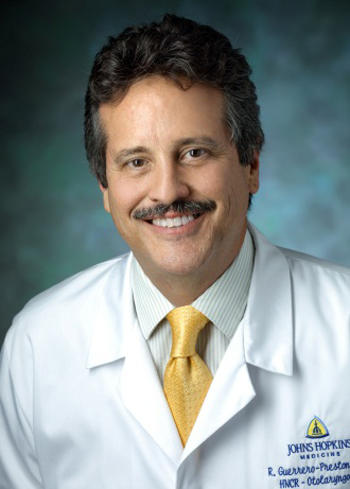Grantee Spotlight: Rafael E. Guerrero-Preston, Dr.P.H., M.P.H. - Exploring Genetic and Epigenetic Factors Underlying Head and Neck Cancer Disparities
, by CRCHD Staff
Rafael E. Guerrero-Preston, Dr.P.H., M.P.H., Assistant Professor of Otolaryngology-Head and Neck Cancer Surgery at the Johns Hopkins University School of Medicine in Baltimore, MD, presented findings from his epigenomic research at the Sixth American Association for Cancer Research Conference on the Science of Cancer Health Disparities in Racial/Ethnic Minorities and the Medically Underserved, in December 2013 in Atlanta, GA
With the support of an NCI/CRCHD K01 grant, Guerrero-Preston has been investigating epigenomic biomarkers to improve head and neck cancer early detection and clinical management, and reduce survival disparities in oral and oropharyngeal cancer. This research could help enhance our understanding of why the death rate among black patients from the most common forms of head and neck cancer is about 18% higher than that of white patients, despite the overall decline in deaths from head and neck cancers. “This is the first time that evidence of survival disparities associated with genomic and epigenomic alterations in head and neck cancer have been documented,” he said. “Black and Puerto Rican men have a greater oral and head and neck cancer burden than non-Latino white men in the United States, but the biological basis for these differences is poorly understood.”
Using a two-stage epigenomic study design, Guerrero-Preston and colleagues tested the theory that both genetic and environmental factors contribute to ethnic disparities in head and neck cancer survival. In the discovery phase, the researchers performed an integrated molecular analysis using methylation sequencing, exome sequencing, mRNA expression, and qPCR platforms to evaluate 107 head and neck squamous cell carcinoma samples. In the validation phase, they validated their findings using 279 samples from The Cancer Genome Atlas project.
Guerrero-Preston identified 316 genes harboring cancer-specific promoter methylation and 10 tumor suppressor genes with concurrent promoter methylation and somatic mutations. He also discovered clustering of genetic and epigenetic events that distinguished smokers from non-smokers, human papillomavirus (HPV)-positive tumors from HPV-negative tumors, and Black from non-Latino white head and neck cancer patients. “We were able to distinguish genetic events that may have occurred because of a disparity in the patient’s environment and lifestyle rather than in the patient’s genetic DNA sequence alone,” he said.
Scientists have long known that environmental and lifestyle factors such as diet, smoking, alcohol consumption, and toxins can change the expression of our genes. These changes are influenced by an intricate network of chemical switches within our cells, known as the epigenome, that can turn our genes on or off and determine how our cells look, grow, and act.
Alcohol and tobacco use are the two most important risk factors for head and neck cancers. HPV-16 and Epstein-Barr virus have also been implicated as risk factors for some types of head and neck cancers, particularly oropharyngeal cancers that involve the tonsils or the base of the tongue, according to Guerrero-Preston. All four of these risk factors could be linked to either lifestyle or the environment in which underserved populations live.
Guerrero-Preston’s lab observed that Black and non-Latino white head and neck squamous cell cancer patients had significantly higher molecular alterations in the PAX, NOTCH1, and TP53 pathways. His lab also found that head and neck patients with both PAX5 promoter mythylation and p53 gene mutations had worse survival overall than patients with p53 mutations alone.
Guerrero-Preston says they need to recruit more racially/ethnically diverse patients, including Latinos, Asian/Pacific Islanders, and Native Americans willing to participate in studies, in order to replicate these findings in larger cohorts. He also plans to verify these results in head and neck cancer patients in Spain and India. “In tandem, we want to perform similar studies in patients with other aerodigestive tract tumors, such as lung and esophageal cancers,” he said. He will also look at other screening markers using saliva, urine, and blood to assess the effect of high-risk behaviors, such as smoking and drinking. This could potentially have an impact on community-level prevention efforts, since these sorts of screenings can be conducted easily at community clinics.
Born in Puerto Rico, Guerrero-Preston earned his B.A. degree from Columbia University in New York City in 1979. He went on to finish his basic science training at Mount Sinai School of Medicine, in New York, from 1979-1981. He subsequently received his M.P.H. from the University of Puerto Rico, San Juan, in 1995 and his Dr.P.H. from the same university in 2004. He began a two-year postdoctoral training program in cancer prevention and epigenomics the following year. In 2008, he became an instructor at the Johns Hopkins School of Medicine and an Assistant Professor in 2012.
Guerrero-Preston is a member of the American Public Health Association and the American Association of Cancer Research, and is the author of more than 20 peer-reviewed scientific articles.
Visit the links below to learn more:
- Head and Neck Cancers
- CRCHD Spotlight on K22 grantee Dr. Sunday Akintoye who is studying the biology of bone cells to reduce head and neck cancer treatment complications
